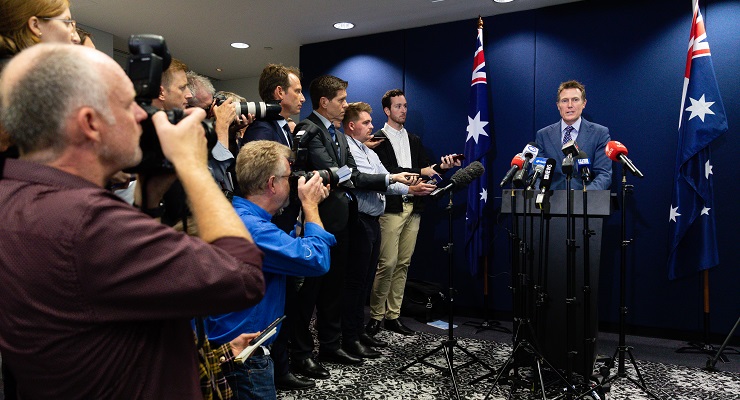
The aim of Christian Porter’s tearful press conference yesterday was clear: recast himself as the victim of a media smear, a “whispering campaign”, which, if successful, would somehow totally destroy the rule of law in Australia.
The same journalists who left then Labor leader Bill Shorten alone over historic rape allegations in 2014 had hounded Porter to the verge of a mental breakdown.
That narrative has quickly become the backbone of the Coalition’s line on Porter. And since yesterday it’s been picked up and run with by several media commentators, who’ve been all too keen to cast their own colleagues as the true villains of this whole affair.
The Shorten difference
There was an element of hypocrisy, according to Porter, to the way journalists laid off Shorten and the “trial by media” he’d been forced to endure.
“There weren’t any calls for [Shorten] to stand down or public reporting of anonymous, unsourced, untested material designed to try somebody in public while they are duty-bound to remain silent,” Porter said.
But despite attempts by the government and a number of journalists to equate the circumstances of Porter and Shorten in relation to historic rape allegations, there are some fundamental differences.
The most important is that the complainant in Shorten’s case was, and is, alive and available to provide information to police, who were thus able to conduct an investigation and question both the complainant and Shorten before concluding there was no reasonable prospect of conviction.
Any media coverage beforehand of that investigation may have affected the prospects of a prosecution. In the Porter matter, there can never be any prospect of a prosecution given the death of the complainant, so that impediment is removed entirely. There never has been and (if the government has its way) never will be any kind of proper investigation of the claims against Porter.
The second difference, less important but significant nonetheless, is that Shorten was not a cabinet minister, and particularly not the attorney-general, who occupies a unique place in the legal system and in legislation.
It is untenable for a man with such a cloud over him as Porter now has to remain the first law officer until the best possible resolution of the matter is obtained.
Sinister phrase
Porter began his statement by falsely claiming journalists hadn’t put allegations to him (Crikey was among the many outlets which had sought comment) before quickly clarifying.
But from a crisis management perspective, it was his allegations of a “trial by media” that were most useful.
That phrase has connotations which are sinister and Salem-esque, but its actual meaning is less fuzzy. Should journalists never ask questions about serious allegations? Should they not report on matters which might also intersect with the criminal law?
Still, it sounded serious and ominous enough that, in an unsurprising display of the Australian media’s capacity to self-flagellate when pushed by politicians, Porter’s line worked.
Writing in The Australian, Paul Kelly claimed that the Porter incident was a “vicious political and media contest”. A trial by media, wrote Kelly, would be “a threat to justice”.
Meanwhile, his stablemate Dennis “the curve” Shanahan wrote that “unparalleled politicisation and weaponisation of sometimes anonymous allegations of sexual assault and rape have formalised trial by media and sidelined the rules of journalism and the law”.
Nine’s Chris Uhlmann blamed the whole situation on Twitter, as usual: “It’s all played out in the media and the vile sewer of social media for clicks and political point-scoring.”
Over in the Nine papers, the allegations against Porter were reduced to “a rumour relayed over dinner” — a clear message to reporters who’d made anything more of it.
Lots of hypocrisy
The way journalists so eagerly reproduced Porter’s own victim narrative speaks volumes about the rank hypocrisy that lingers in this profession.
Let’s not forget that running trials by media is literally the entire modus operandi of News Corp (and occasionally Nine). Crikey ran a whole 13-part series on all the people Murdoch land has savaged — from Yassmin Abdel-Magied to Gillian Triggs. It’s now on to transgender children who, unlike the attorney-general, usually can’t hold a big press conference to tell their side of the story.
The whole Porter affair does reveal some unsavoury truths about parts of journalism in this country — just not the ones the attorney-general’s defenders are pushing. If any of the (numerous) allegations about Porter are even close to true, then all the journalists who have for years massaged his ego and used him as a source have been played.
Faced with being exposed as gutless stenographers, it’s little wonder so many journalists are quick to adopt the Porter/party line: that the attorney-general is the real victim, demonising their colleagues who bothered to ask questions.
If you or someone you know is impacted by sexual assault or violence, call 1800RESPECT on 1800 737 732 or visit 1800RESPECT.org.au.









Crikey encourages robust conversations on our website. However, we’re a small team, so sometimes we have to reluctantly turn comments off due to legal risk. Thanks for your understanding and in the meantime, have a read of our moderation guidelines.